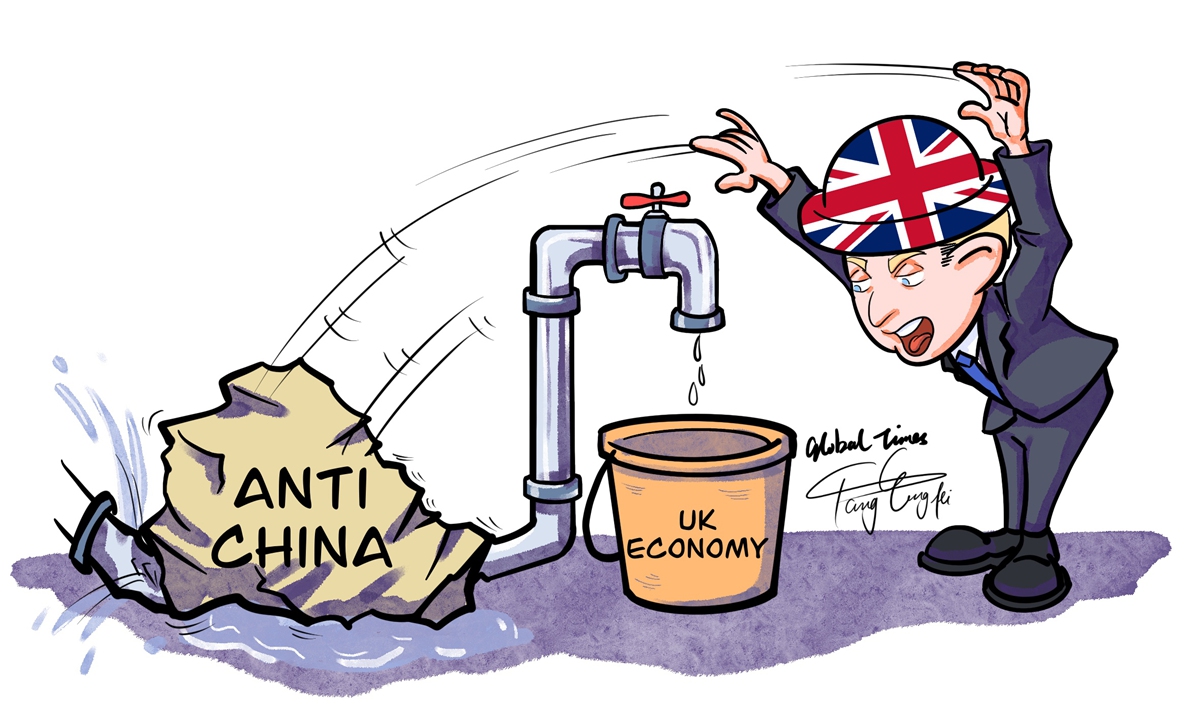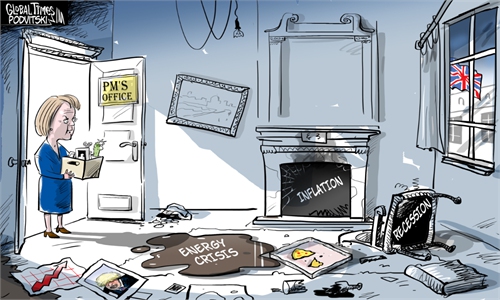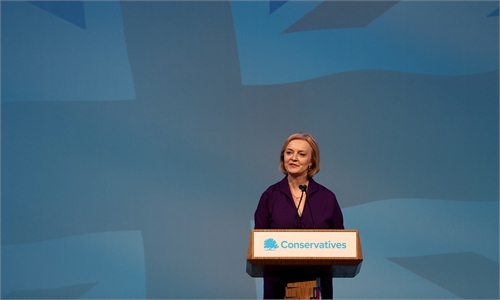
Illustration: Tang Tengfei/Global Times
Global Britain has a new leader. Liz Truss replaced the bombastic Boris Johnson as Prime Minister, having been chosen, according to the quirks of British democracy, by approximately 0.17% of the voting population.
In a lackluster campaign which dragged on endlessly through the summer, it was hard to keep track of all the promises of the two contenders. Not so much the Maggie 'I'm not for turning' Thatcher, on whom she claimed to style herself, Truss zigzagged around key issues like the crisis on the cost of living.
Inevitably with energy prices predicted to soar amid rising inflation, these concerns eclipsed other vital matters like climate change let alone foreign policy. Nevertheless, with the two candidates seeking to outdo each other on who could appear the toughest in standing up to "autocracy" as they sought to win over the aging Tory membership, China became an issue for the first time for any election in Britain.
For his part, Sunak was to declare that China to be the "number one threat" facing the UK, calling for a new NATO-style "international cooperation against China" to counter its "nefarious activities and ambitions." He further pledged to close all of the thirty or so Confucius Institutes, their programs for teaching Chinese language and culture seen somehow as a cover for promoting Chinese propaganda.
Truss meanwhile is on record as wanting to arm Taiwan. We should learn the lessons of Ukraine where this was left too late, she claimed. She has also reportedly called for China to be labelled as "guilty of genocide" in Xinjiang.
Then, in the last week of the leadership contest, Truss was to escalate further. Whilst the 2020-2021 Integrated Security, Defence and Foreign Policy Review had designated China as a "systemic competitor" -- on the one hand to be guarded against, but not ruling out potential for cooperation in areas such as trade and climate change -- Truss declared her intention to revisit this with a view to changing China's status to an 'acute threat' on a par with Russia.
As foreign secretary, Truss had overseen the secret maneuverings to get AUKUS into place. She has also promoted military links with Japan and no doubt there will be more to come under her premiership in terms of promoting British military power projection in the Pacific. Indeed she has pledged to increase the defense and security budget considerably to 3 percent of GDP over the next 7 years to back her own particular vision of Global Britain.
However, now in power, when it comes to the crunch, will she risk so seriously damaging UK-China relations but changing China's current designation? Where will Taiwan actually end up on her list of priorities? Whilst Tory ideologues and anti-China hawks may have gained the upper hand, those concerned over trade, together with the Treasury, may well question the wisdom of jeopardizing economic ties with the world's second largest economy, especially now with the UK tipping into recession.
Commentators are asking whether she has really thought through the implications of designating China as a threat, namely the "security versus trade" trade-offs here.
Finally, in the last stages of her leadership campaign, Truss came up with her answer to the crisis of the cost of living -- namely "to grow the economy." But how? With profits low, the reduction of tax cannot do this.
Truss though has another answer here, at least so she thinks. Instead of continuing trade and economic dialogues with China, she intends to launch a "New Commonwealth deal" to strengthen economic ties across one of the largest groups of "freedom-loving democracies." This, she believes, will squeeze China more by helping to stop the growing influence of the BRI. In fact, all the Commonwealth countries bar Australia, Canada and a handful of small island states are already members of the BRI -- many of them are low-income economies -- and if the UK can negotiate some win-win deals with them so much the better. But why should they sacrifice economic relations with China if this has been working for them?
Such a deal would anyway take some years to get into shape even if it was sufficient to fill the gap left by an economic rupture with China. And the awesome scale of the economic challenges will leave little time for such a demanding diplomatic initiative as this.
Truss, nevertheless, is convinced that China's rise is not inevitable. We might recall that when Johnson first launched his ambitious Global Britain project, it was left to a former Tory prime minister, John Major, to point out that the UK is no longer a "great power" adding the warning that "complacency" and "nostalgia" are the routes to a national decline.
What will it take to bring Truss down to earth? The US "democracy versus autocracy" agenda is infiltrating across the spectrum of mainstream politics with even those in favor of a more pragmatic diplomacy wavering in the face of pressure to take a tougher stance on China. But as the cost-of-living crisis threatens to push more than 3 million people into poverty, and with experts predicting inflation to exceed 20 percent next year, the wave of worker protests is growing. It may then be that pressures from this quarter, linked in with opposition to increases in military spending, develop the momentum necessary to propel Britain onto a path in the world based more on international cooperation than confrontation.
The author is a UK-based senior lecturer in Asia-Pacific studies, peace and anti-war activist, and author of China's Global Strategy: Towards a Multipolar World. opinion@globaltimes.com.cn


